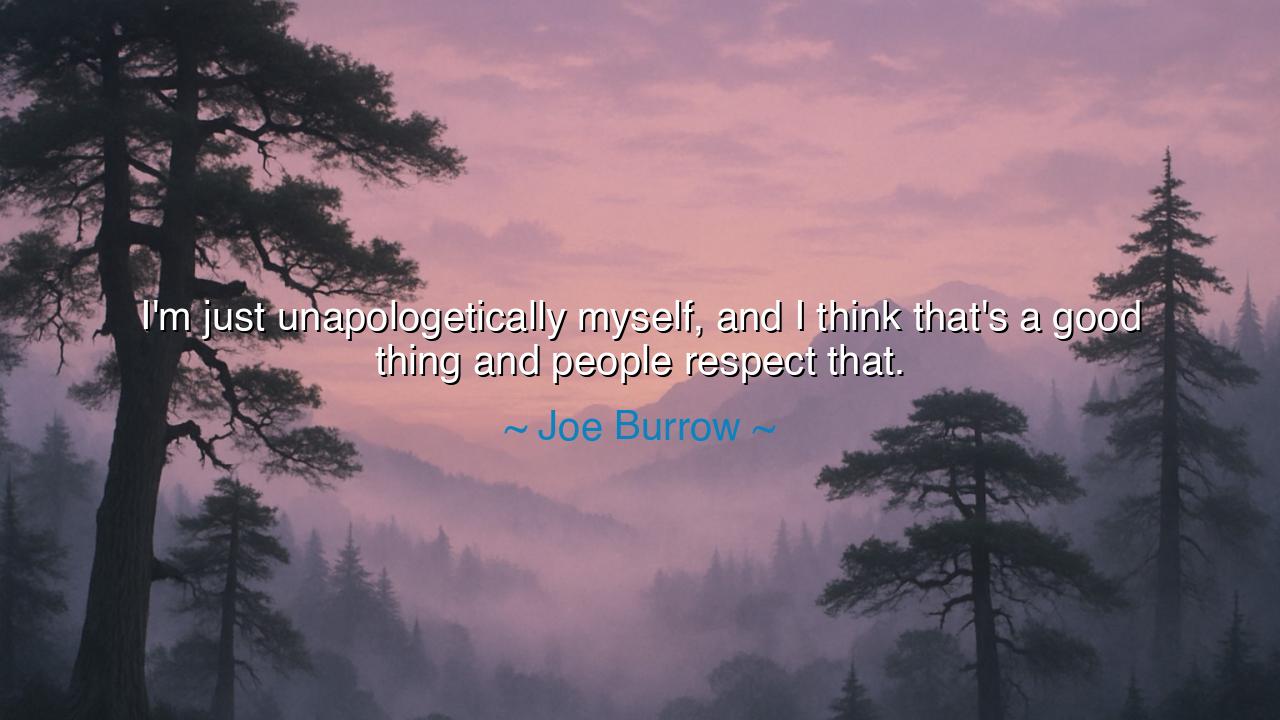
I'm just unapologetically myself, and I think that's a good thing
I'm just unapologetically myself, and I think that's a good thing and people respect that.






The words of Joe Burrow—“I’m just unapologetically myself, and I think that’s a good thing and people respect that.”—carry the spirit of authenticity, a virtue as old as the mountains and as necessary as the breath of life. In this age, when masks are worn more often than faces and approval is sought more often than truth, such a statement resounds with the power of a trumpet call. To be oneself without apology is not arrogance, but courage—the courage to stand before the world as you are, without fear of its judgment, without bending to its fleeting fashions.
The ancients praised such courage. The Stoic philosopher Epictetus taught that the wise man lives in accord with his own nature, unshaken by the opinions of others. Socrates, too, was accused, condemned, and sentenced to death, but he never ceased to speak in his own voice, never bartered away his integrity for safety. In Burrow’s words, though uttered in the field of sport, we hear the same truth: that to be authentic is to possess a quiet strength greater than crowns, greater than applause. For men may cheer or jeer, but the man who is himself walks with peace.
Consider also the tale of Joan of Arc. A peasant girl, ridiculed and doubted, she rose to lead armies, not by pretense, but by the fire of her true conviction. She was unapologetically herself, a voice claiming divine guidance in a world that laughed at such claims. Though she was betrayed and burned, her authenticity broke the chains of cynicism and inspired a nation. Her life shows us that the world may resist the truth of a person, but in time, it bows in respect before the power of a soul that refuses to be false.
Burrow’s words also remind us of the nature of leadership. People do not respect the one who imitates, who bends like a reed to every shifting wind. They respect the one who stands firm, whose words and deeds arise from a single source. Authenticity draws loyalty, for it gives others permission to be authentic as well. Just as a flame lights other flames without diminishing itself, so the unapologetic self inspires courage in those who behold it.
Yet authenticity is not license for cruelty or selfishness. To be unapologetically oneself does not mean to disregard wisdom or to scorn humility. It means to strip away falsehood, to cast aside fear, and to live in harmony with the truth of one’s own nature. The arrogant shout their ego; the authentic live their truth with quiet strength. Burrow reminds us that it is this balance—honest confidence without arrogance—that calls forth the respect of others.
The lesson is plain for all: dare to be yourself. Do not clothe your soul in borrowed garments, nor silence your voice out of fear of scorn. Speak with honesty, act with integrity, and walk with the rhythm of your own heart. You may not please all, but those who matter will respect you, for they will see in you the courage they long for in themselves.
Therefore, let each of us take this teaching into daily life. In friendship, in labor, in love, be unapologetically yourself. Strive to grow, but do not pretend. Strive to improve, but never betray your essence. For in the end, the highest honor is not to have worn the mask most convincingly, but to have walked the earth as your true self, leaving behind the clear echo of a soul unashamed. This is the wisdom of the ages, spoken anew by a modern voice on the field of battle—not with sword or shield, but with authenticity and courage.






AAdministratorAdministrator
Welcome, honored guests. Please leave a comment, we will respond soon